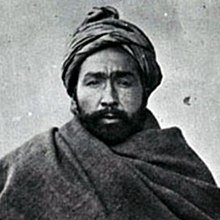Habibullah Kalakâni
Amir Habibullah Kalakâni ( Pashtun حبیب الله کلکاني; Persian حبیبالله کلکانی, DMG Ḥabību-llāh Kalakānī ; * around 1890 in Kuh Daman, Afghanistan ; † November 1, 1929 in Kabul , Afghanistan), also disparagingly called Batscha-e Saqqao ( child of a water carrier ) by large parts of the people , was King of Afghanistan from January to October 1929 .
The Tajik Habibullah came from the Kalakan region north of Kabul and grew up as the son of a water carrier in very poor circumstances. He had no schooling and was raised strictly Muslim, according to the village traditions. He was also under the influence of the fundamentalist Muslim Brotherhood . He was the leader of a small criminal gang that raised money through extortion, stolen goods and kidnapping.
The efforts of King Amanullah Khan to open up economically to the West, especially Germany and the British Empire, led to numerous tribal uprisings. The climax of these revolts occurred during the king's foreign trip in 1927 (also known as the " Khost Revolt "). As the leader of an uprising in Kalakan , Habibullah Kalakani, with massive help and the assistance of the British, marched into Kabul on January 17, 1929 and overthrew the reformer and King Amanullah Khan and his successor Inayatullah Khan . He immediately introduced the Sharia as legislation, and at the same time his followers plundered in their area of influence. In October 1929 Habibullah himself was overthrown with British help by the later King Mohammed Nadir Shah and fled. By breaking his word, he was lured from Kalakan to Kabul, captured and shortly afterwards publicly executed .
The Afghan poet Khalilullah Khalili later dedicated his work "Ayyār-e az Ḫorāsān" ("The Hero of Khorasan"), in which Habibullah Kalakâni is described and celebrated as a sincere hero.
| personal data | |
|---|---|
| SURNAME | Habibullah Kalakâni |
| ALTERNATIVE NAMES | Habibullah Ghazi |
| BRIEF DESCRIPTION | King of Afghanistan |
| DATE OF BIRTH | around 1890 |
| PLACE OF BIRTH | Daman cow, Afghanistan |
| DATE OF DEATH | after October 1929 |
| Place of death | Kabul , Afghanistan |
